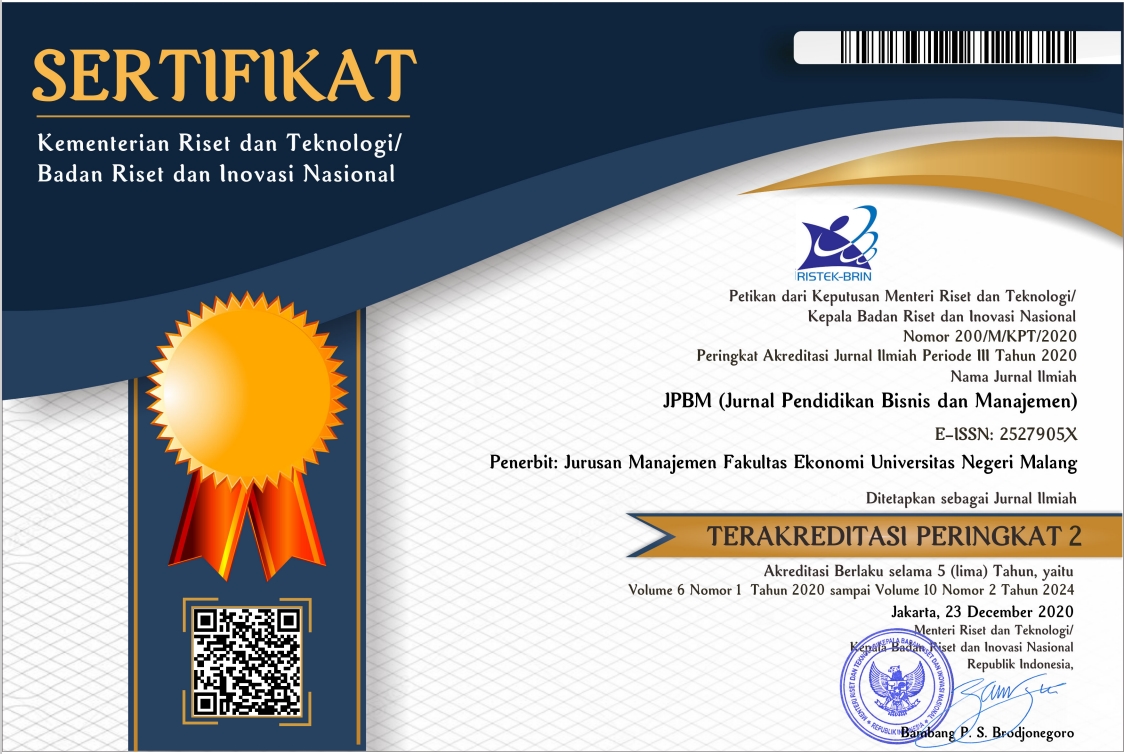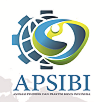Implementation Analysis of Curriculum 2013 Towards Interactive Learning Aspects and Multimedia-Based Learning
Abstract
This research aims to determine the application of interactive and multimedia-based learning which conducted by the teachers from office administration in state vocational high school 2 Blitar. This research is qualitative research then the subjects are the teachers’ expertise of administrative programs, vice principal of curriculum and students. Data collection techniques used observation, interviews, and documentation. The results of this research are (1) interactive learning have been implemented, (2) Multimedia-Based learning has been implemented, but it is needed for developing the multimedia which used for teaching process.It can be seen that the teacher conducts learning in accordance with interactive learning indicators. The implementation of the curriculum 2013 for aspects of multimedia-based learning has been carried out by teachers by implementing learning that contains multimedia-based learning indicators.
Keywords
Full Text:
PDFReferences
Kuyumcu, F. N. 2012. The Importance of “Art Education” Courses in the Education of Prospective Teachers. Procedia - Social and Behavioral Sciences, The World Conference on Design, Arts and Education (DAE-2012), May 1-3 2012, Antalya, Turkey 51, 474–479. https://doi.org/10.1016/j.sbspro.2012.08.192
Ministry of Education and Culture. 2013. Republic of Indonesia Minister of Education and Culture Regulation No. 70 of 2013 concerning the Basic Framework and Structure of Vocational Middle School Curriculum/Madrasah Aliya Vocational. Jakarta: Ministry of Education and Culture (Indonesian Origin)
Gröschner, A., Schindler, A.-K., Holzberger, D., Alles, M., & Seidel, T. 2018. How systematic video reflection in teacher professional development regarding classroom discourse contributes to teacher and student self-efficacy. International Journal of Educational Research 90, 223–233. https://doi.org/10.1016/j.ijer.2018.02.003
Gutiérrez, M., & Tomás, J.-M. 2018. Motivational Class Climate, Motivation and Academic Success in University Students. Revista de Psicodidáctica (English ed.) 23, 94–101. https://doi.org/10.1016/j.psicoe.2018.02.001
Hossain, H.M.S., Khan, M.A.A.H., & Roy, N. 2017. Active learning enabled activity recognition. Pervasive and Mobile Computing, Special Issue IEEE International Conference on Pervasive Computing and Communications (PerCom) 2016 38, 312–330. https://doi.org/10.1016/j.pmcj.2016.08.017
Kostiainen, E., Ukskoski, T., Ruohotie-Lyhty, M., Kauppinen, M., Kainulainen, J., & Mäkinen, T., 2018. Meaningful learning in teacher education. Teaching and Teacher Education 71, 66–77. https://doi.org/10.1016/j.tate.2017.12.009
Mayer, R.E. 2014. Incorporating motivation into multimedia learning. Learning and Instruction 29, 171–173. https://doi.org/10.1016/j.learninstruc.2013.04.003
Munastiwi, E. 2015. The Management Model of Vocational Education Quality Assurance Using ‘Holistic Skills Education (Holsked).’ Procedia - Social and Behavioral Sciences, The 4th World Congress on Technical Vocational Education and Training (4thWoCTVET), 5-6 December 2014, Universiti Tun Hussein Onn Malaysia, MALAYSIA 204, 218–230. https://doi.org/10.1016/j.sbspro.2015.08.144
Oprea, C.L. 2014. Interactive and Creative Learning of the Adults. Procedia - Social and Behavioral Sciences, The Fourth International Conference on Adult Education, Romania 2014 142, 493–498. https://doi.org/10.1016/j.sbspro.2014.07.654
Pahljina-Reinić, R., Kolić-Vehovec, S. 2017. Average personal goal pursuit profile and contextual achievement goals: Effects on students’ motivation, achievement emotions, and achievement. Learning and Individual Differences 56, 167–174. https://doi.org/10.1016/j.lindif.2017.01.020
Paratore, J.R., O’Brien, L.M., Jiménez, L., Salinas, A., & Ly, C. 2016. Engaging preservice teachers in integrated study and use of educational media and technology in teaching reading. Teaching and Teacher Education 59, 247–260. https://doi.org/10.1016/j.tate.2016.06.003
Rodríguez, M., Prada, A., Díaz, I., Gonzalez, E., & González-Miquel, M., 2018. Active Learning of Process Control, in: Friedl, A., Klemeš, J.J., Radl, S., Varbanov, P.S., Wallek, T. (Eds.), Computer Aided Chemical Engineering, 28 European Symposium on Computer Aided Process Engineering. Elsevier, pp. 1693–1698. https://doi.org/10.1016/B978-0-444-64235-6.50295-3
Soruç, A., 2015. What Makes Redundant Presentation of Multimedia Learning Difficult? Procedia - Social and Behavioral Sciences, The Proceedings of 6th World Conference on educational Sciences 191, 2844–2848. https://doi.org/10.1016/j.sbspro.2015.04.402
Walters, B., Potetz, J., & Fedesco, H.N., 2017. Simulations in the Classroom: An Innovative Active Learning Experience. Clinical Simulation in Nursing 13, 609–615. https://doi.org/10.1016/j.ecns.2017.07.009
DOI: http://dx.doi.org/10.17977/um003v4i12018p030
Refbacks
- There are currently no refbacks.
JPBM (Jurnal Pendidikan dan Bisnis Manajemen) is licensed under a Creative Commons Attribution-NonCommercial-ShareAlike 4.0 International License.
JPBM (Jurnal Pendidikan dan Bisnis Manajemen) is abstracted and indexed in :
















